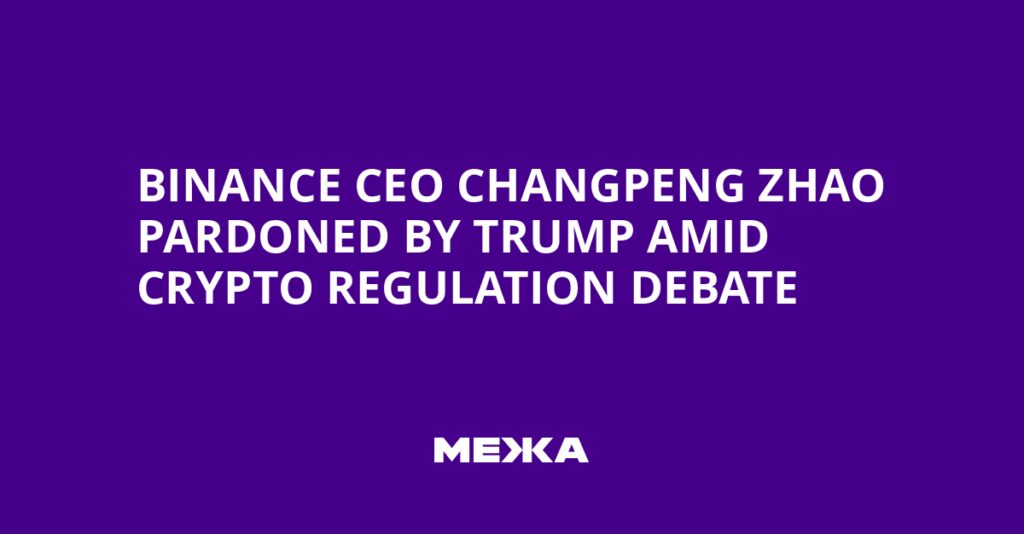New York – Changpeng Zhao, also known as CZ, has once again become the center of attention in the crypto world after receiving a pardon from President Donald Trump – a move that fuels discussions about whether big money interests can “solve” problems in the new era of crypto politics under the guise of Trump 2.0.
Zhao’s influence on the crypto industry since the launch of Binance in 2017 remains one of the most notable factors in the global digital asset landscape. CZ runs one of the most influential platforms in the space, which has played a key role in the evolution of the market.
To put it simply: to withdraw around $100 from a bank account and use those funds to buy or sell cryptocurrencies in many countries around the world, Binance makes this process quick and with minimal fees. The platform also offers more advanced financial services, such as margin trading and staking – a way to earn passive income from your assets.
Binance is not only the largest crypto exchange in terms of number of users (over 280 million worldwide) and trading volumes (over $217 billion per day); it also controls around 40% of the market among centralized cryptocurrency exchanges.
However, Binance has not always complied with regulatory requirements in different jurisdictions, including the United States, which is why the global version of the platform was restricted in 2019. In response, Binance launched a more limited service, Binance.US, but in practice, many users outside the restrictions have sought ways to circumvent regulatory barriers, according to media reports and the Department of Justice.
In 2023, US federal prosecutors said Binance had become a hub for transactions related to child pornography, drug trafficking, terrorism financing and money laundering. It was also noted that the company did not have proper anti-money laundering reporting protocols, although such monitoring is generally the norm for financial companies; one of the compliance department employees even wrote: “we need a banner ‘he launders drug money – come to Binance, we have cake’.”
The company and Zhao pleaded guilty to money laundering in the United States. As part of a deal with the government, Zhao resigned as CEO, paid a $50 million fine and served four months in federal prison. According to Forbes, Zhao still owns about 90% of the company’s shares, giving it a market capitalization of more than $80 billion.
My official record had been damaged for some time, but my reputation remained strong. No one, not a single person, stopped doing business with me.
Zhao remains synonymous with Binance and his influence in the industry has persisted even after serving his sentence. In a conversation after the latest events, Zhao, a Canadian-born Chinese citizen now living in the United Arab Emirates, reflected on his recent ups and downs, noting: “My official record was damaged for a while, but my reputation remained strong. No one, not a single person, stopped doing business with me.”
Over the years, the US crypto scene has remained largely a theoretical parallel to traditional finance – a community of online pioneers who were developing the future of money through networks outside of government and central banks.
Today, the crypto market has grown into a global ecosystem valued at approximately $3.5 trillion, increasingly intertwined with legitimate finance. Regulators have also increased their focus on this space: Federal Reserve officials have emphasized that crypto assets “are no longer on the periphery” and “are increasingly integrated into payment and financial infrastructure” – it’s a signal to the industry and investors regarding the growing regulatory environment.
Binance Impact on Global Market and Regulatory Challenges
Institutional interest in crypto has increased thanks to Bitcoin ETFs, and the US Congress has recently considered regulatory initiatives aimed at increasing transparency and protecting investors. However, Americans’ confidence in crypto remains mixed: according to Pew Research, approximately 63% of adults in the United States do not feel confident in crypto as a safe investment vehicle.
Against the backdrop of the regulatory debate, the crypto industry supported the re-election of Donald Trump, and the candidate himself expressed support for cryptocurrencies, which have become a key factor in discussions about future regulation and the integration of digital assets into traditional finance.
Trump’s “CryptoCapital” focuses on the goal of making the United States the crypto capital of the world, even using extreme elements, such as his own coin and the goal of creating a national strategic reserve of Bitcoin to enrich early adopters and undermine the anti-institutional ethos of crypto founders.
Changes in the regulatory landscape not only shape the rules, they also influence investor decisions: platform transparency, compliance with laws, and level of customer protection become deciding factors when choosing an exchange to invest in crypto assets in the United States.
What does this mean for US investors?
A pardon hasn’t stopped CZ, but the pardon issue and the future of Binance could affect confidence in global crypto exchanges and the overall regulatory stance toward the U.S. crypto market. As cryptocurrencies become increasingly integrated with traditional finance, investors must weigh regulatory risks and platform transparency to make an informed choice and minimize potential losses.




